'Cha' anyone?
We stayed at the bungalow of the father and little brother of a close family friend from back in London, it was right in the sticks south of the local river Shorma. It was quite a nice scenic area with rice paddy fields as far as the eye could see surrounding the little village. I love how everyone seems to be related to everyone here and nobody’s a stranger, actually that can't always be a good thing over here.
Our main purpose for visiting Sylhet was to see a real working Tea estate where all you tea-guzzling people especially back in the UK get your morning and/or afternoon fix of this herbal beverage (locally known as 'Cha') from. I’ve always seen these tea gardens in pictures and packets of Typhoo tea but I wanted to see and get a feel for how the whole industry works.
Watch out for the snipers!
But first we visited a place called Zero point on the Bangladesh-India border, its more commonly known by the collective name of Jaflong-Tamabil and its famous for the large sized pebbles that roll downstream from the streams and rapids that hug the heavily forested hills. These hills serve as a natural border between the two countries. Rumour has it that if you try and cross the border into India you’ll get sniped at by Indian border guards from high up on the hills. A comforting feeling no doubt I think you’ll agree especially when you’re only yards away from the border!
Here are some photos for your viewing pleasure.
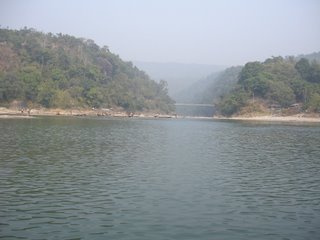
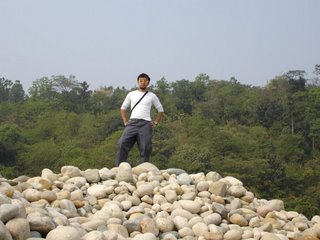
An educational birthday
The next day was my birthday (yay…) so we set out for my cousin’s house about 20 miles away from Sylhet town, her husband who is a doctor and professor used to be the resident doctor at a nearby tea estate until recently. Since we were late in arriving at his place and there wasn’t much daylight left we decided to go straight to that very tea estate in a place called Shamshernagar where his best friend is currently the serving doctor for the estate workers.
Enroute he filled us in on the various tea industry-related stories that I personally wasn’t aware of. I took my handy MP3 player along to record the conversations we had because I knew it was no short story.
He quickly cut through all the romantic notions one might get of tea estates on rolling hills - perhaps the ones from colonial times, right through to the bleeding heart of the sad stories of the tea workers. These are people who have been ‘imported’ from the economic backwaters of Orissa and other similar areas of India back in the 19th century during the days of the British empire.
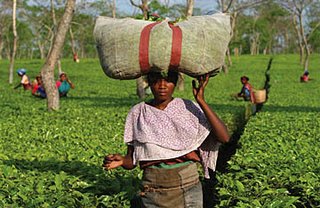
Incase you didn't know what a tea worker looks like
The descendants of these workers still work the tea gardens and lead pretty lonely lives. Although not outcasts, they hardly ever venture into the nearby towns and villages. Because they are not properly integrated into the rest of Bangladeshi society their own language is somewhat left intact albeit with a few local dialects and vernacular. All their simple needs are met by the tea estate management who make sure the colonial tradition of economic dependence is intact. For example many of the workers have become quite addicted to some kind of local brew of alcohol.
This alcohol is heavily subsidised for tea estate workers – namely the tea-pickers, with one sole purpose: As long as they are hooked on this stuff, most of what little they earn from tea-picking goes on the booze thus keeping them on a short leash. The tea companies who run these estates I’m told, are pretty much forced to uphold these practices to prevent the simple-minded estate workers from wondering off and finding out there’s a better life outside of the tea-picking business.
What’s more, ordinary Bangladeshi folk won’t want to work in tea estates, its as if these poor simple people are simply a continuation of the long line of ‘specially bred’ tea-pickers brought over by the British.
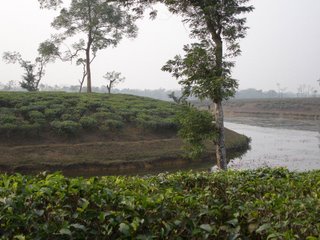 This is just a tiny snippit of this huge tea estate
This is just a tiny snippit of this huge tea estate
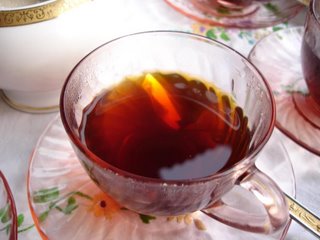
This is - I'm told, the brew from this particular tea garden
A Brief History of Tea
If my cousin’s husband’s correct, tea – as we now know it, was first discovered by Genghis Khan back in the 13th century who used to order his troops to only drink boiled hot water. Now since there’s only so much hot water one can drink before getting sick of it, the soldiers decided to add something for flavour, no prizes for guessing what that was. Granted, there are a few variants of this story but I can’t be bothered to look them all up! If you’re not satisfied with this one go to wikipedia.com.
The tea-picker’s wage
The average tea-picker on an estate gets paid around 32 Taka (approx 46 Cents) for 26 Kilos of green tea leaves per day, thereafter for every extra Kilo of tea leaves plucked, the worker gets 1 Taka (suffice to say that doesn’t even register on the currency exchange rate!). I can imagine picking 26 Kilos of tea leaf is no mean feat, and to imagine having the strength to pick another few extra Kilos is beyond my comprehension. Nevertheless when you’re very survival depends on it, I think THEN you’ll find the strength!
And when you blow a good portion of your earnings on cheap liquor, I guess there isn’t much left to do but twiddle your thumbs and wait for the next working day.
Divide and Rule
There’s a certain system that’s been lent down from colonial times till today and that is of the hierarchy system effectively dividing the upper management and doctors of a tea estate and the workers. If, for example a tea worker needs to visit the doctor he/she is not allowed to sit down in the doctor’s office, no matter what. This is purely because he/she is the worker and he/she is the doctor. This idea goes across the board and this particular legacy still exists today.
As my cousin’s husband explained to me, when he was stationed as the doctor at a tea estate the management of the tea company running the estate told him in very explicit terms that ‘you are to accept the 7 maid servants we provide you’. Can you imagine having 7 servants at your beck and call at the age of only 24?! What’s more is that they can’t do anything BUT serve you even if you have no need for them!
And now in this day and age of supposed equal rights for all, we’re told by the pricks who laid out these legacies of subservience in the first place that we need to ‘do more to improve the quality of life for those who live in such conditions’. And yet we still want cheap affordable tea, like coffee, like chocolate and like a whole host of other ‘quaint third world charms’.
I say YOU REAP WHAT YOU SOW!
Anyways I’ve digressed enough on this entry, but I must say the highlight of my trip to Sylhet, or Bangladesh was visiting a tea estate and if I had time I’d even go to the other places I alluded to in my 'Welcome to the land of the Bengal Tiger' entry and probably wax lyrical about them too. But if its not the Eid rush to the various beauty spots in the country it’s the weather that’s eventually played havoc with my original plans.

No comments:
Post a Comment